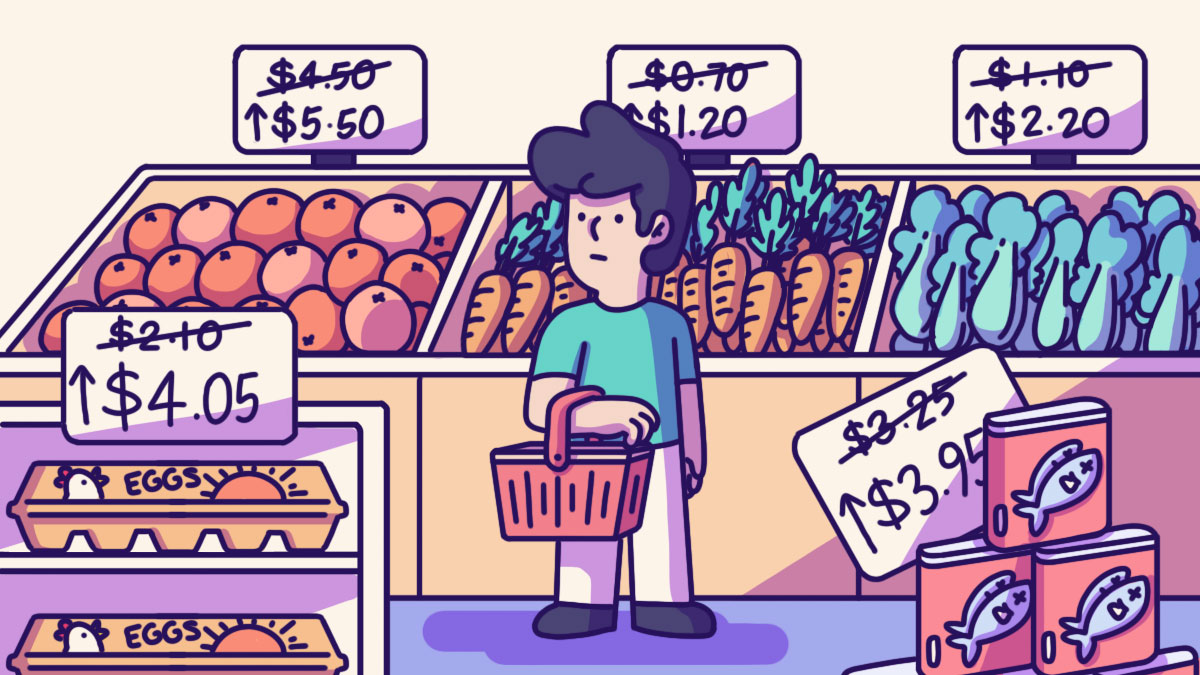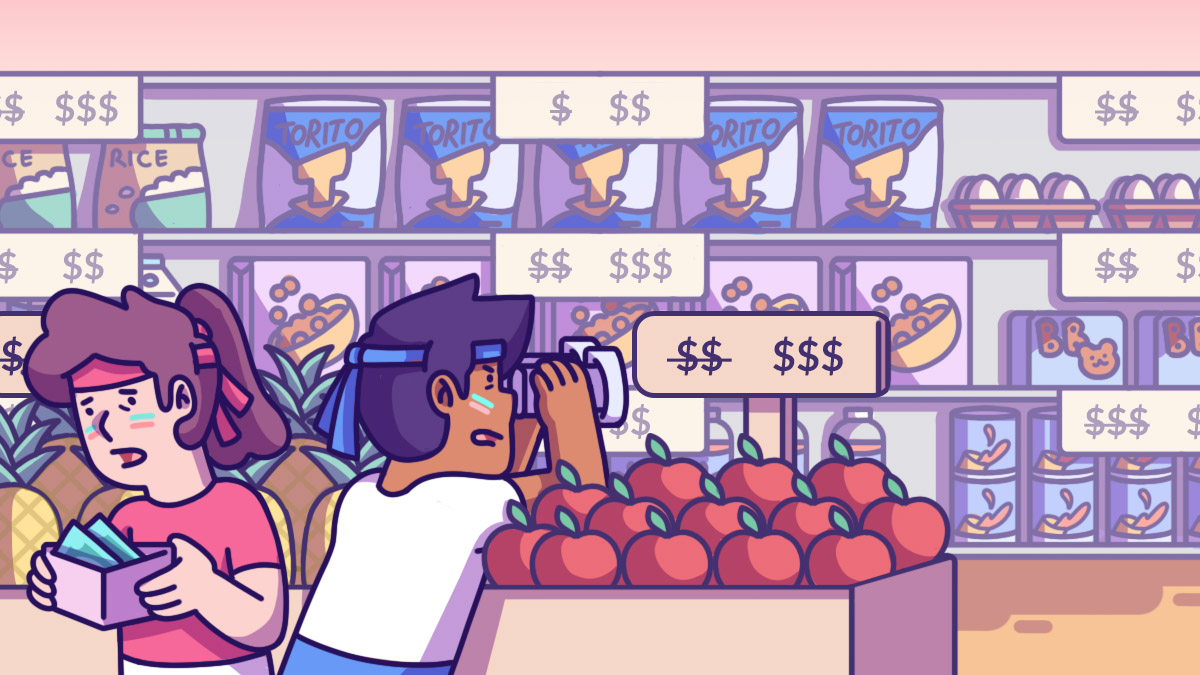Budgeting | Personal Finance | Article
How Does Inflation Impact My Cost Of Living?
by The Simple Sum | 15 May 2024 | 6 mins read

It’s hard to miss the fact that prices for almost everything has gone up over the past couple of years. Even if we don’t understand the economics of it, we sure have felt the effects of inflation.
While inflation is easing, it doesn’t mean that we can also ease off the pedal when managing our finances.
Battling inflation, unfortunately, is something you’re going to have to do for a long time. But with the right strategies in place, the process would be less painful.
Here we’ll cover how inflation affects your cost of living, your plans for retirement, and most importantly, what you can actually do about it.
Related
What is inflation?
Inflation is the ongoing increase in prices over time. It means that everything you buy gets more expensive as the years roll by.
Think about how much you could buy with $5 ten years ago compared to now.
Back then, you could get a decent meal and a drink at the eatery for $5. But today, that same amount might barely cover a meal alone. This constant rise in prices affects our purchasing power and impacts our everyday expenses.
In other words, your dollar loses its value because it can’t buy as much as it used to.
Cost-push inflation and demand-pull inflation: Two reasons prices go up
Cost-push inflation happens when businesses face higher operating costs, which prompts them to raise prices to stay profitable. When it costs more for companies to make or provide something, they pass those extra expenses on to us, the consumers.
Let’s take the example of ride-hailing services. Ride-hailing companies are dealing with a bunch of cost hikes all at once.
First, they might need to pay drivers a larger chunk of the fare to keep them happy and driving. Then, with fuel prices on the rise, their fuel costs shoot up too.
On top of that, maintaining the cars they use—like fixing things when they break down—is getting pricier too. But of course, the ride-hailing company still wants to make a profit.
So, what happens next? To cover these rising costs and keep their profits intact, ride-hailing companies bump up their prices.
This is a classic case of cost-push inflation, where businesses passing on their increased expenses directly affects what we pay for services.
On the other hand, demand-pull inflation happens when there’s a surge in demand for goods and services that surpasses what’s available in the market.
When everyone wants something, but there’s not enough of it to go around, businesses respond by raising prices to match the high demand.
This exact scenario played out with post-COVID travel: more and more people are itching to travel and have some extra cash to spend on vacations. However, the number of hotel rooms available hasn’t caught up yet—maybe due to limited capacity or slow reopening.
So, what do hotels do? They start charging more because they know people are desperate for a place to stay.
Example: In the recent Taylor Swift concert in Singapore, fans from all over the region rushed to the city for the show, flooding the demand for hotel rooms. With limited rooms available, hotels took the opportunity to jack up their prices. And guess what? People were still willing to pay those higher rates just to secure a spot close to the concert venue.
In this kind of situation, where demand far exceeds supply, prices naturally skyrocket—it’s demand-pull inflation in action. Businesses capitalise on the imbalance by charging more, knowing that consumers are eager enough to fork out the extra cash to satisfy their desires.
Not everything inflates at the same rate
Inflation doesn’t affect all items equally—it impacts different items in our budget in unique ways. The Consumer Price Index (CPI) is like a snapshot of this effect, measuring how prices change for a basket of goods and services that we typically use in our daily lives.
Take a look at some recent inflation data in Singapore:
- Property prices: Owning a home gets more expensive as the years go by. In Singapore, we can use the property price index to gauge the rate of increase in private property prices. In 2023, the index increased 6.7% compared to the previous year.
- Food: Whether you’re cooking at home or eating out, food prices have been creeping up. Food inflation in January 2024 was about 3.3%.
- Education: If you have kids in school or you’re pursuing further studies, education costs are rising too. The cost of education increased by 74.7% from 2003 to 2023.
- Healthcare: You might have noticed your medical bills and insurance premiums have increased as of late. As reported by BT in 2019, “Medical cost inflation — was 10 per cent in 2018”.
These numbers show how different parts of our budget are feeling the inflation pinch. By keeping an eye on these trends, you can better manage your finances and make informed choices about where to allocate your money in an increasingly expensive world.
The bad news is…
Inflation has a direct impact on your future financial outlook because the purchasing power of your dollar diminishes over time.
To put it into perspective, consider how the concept of wealth has evolved over generations.
Back in our parents’ day, owning $500,000 was often seen as a major financial milestone. But in today’s context, having that same amount in the bank doesn’t quite hold the same weight.
This shift highlights why retirement planning is so, so important today. With inflation eroding the value of money over time, you need to plan ahead to ensure a comfortable retirement.
When mapping out your retirement strategy, it’s important to factor in inflation. By factoring in the expected inflation rate you can better determine how much you need to save and invest now to maintain your lifestyle down the road.
You can use our retirement calculator to make this process easier.
Strategies to combat inflation
1. Monitor inflation stats
Keep an eye on inflation rates, which you can easily find online or through government announcements.
Why? Because knowing how prices are changing helps you adjust your financial plans and budgets accordingly.
2. Increase your income
Look for ways to boost your earnings to keep up with rising costs.
Whether it’s taking on a side hustle, negotiating a raise at work, or exploring better-paying job opportunities, increasing your income helps offset the impact of inflation on your lifestyle.
3. Plan for future needs
Don’t wait—start planning for your future needs now, especially when it comes to retirement.
Factor inflation into your savings goals and investment strategies.
The earlier you start, the better prepared you’ll be.
4. Invest your savings
Put your extra money to work by investing in assets that can beat inflation. Choose investments like stocks, bonds, or real estate that have the potential to grow faster than the rate of inflation.
Investing helps your money grow over time and preserves its purchasing power against inflation. It’s a smart way to protect your savings and build wealth for the future.


















